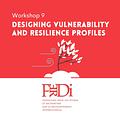




↪ To develop and expand research on vulnerability indicators.
↪ To support the inclusion of vulnerabilities in international development financing.
↪ To advocate for the joint consideration of security issues and economic development issues
The PVCCI measures climate shocks and the exposure of countries (national PVCCI) and their territories (subnational PVCCI) to these shocks.
First developed in 2012, the indicator has been regularly updated. In 2021, FERDI introduced a version of the PVCCI that measures physical vulnerability to climate change at both regional and micro-regional levels.
This project is led by Michael Goujon (CERDI–UCA, CNRS, IRD).
Freely accessible at https://ferdi-indicators.shinyapps.io/PVCCI/
↪ Establishment of a Vulnerability and Resilience Observatory, with a dedicated website to be launched.
↪ Under their partnership, FERDI supports the WAEMU Commission in monitoring the vulnerability of member countries.





